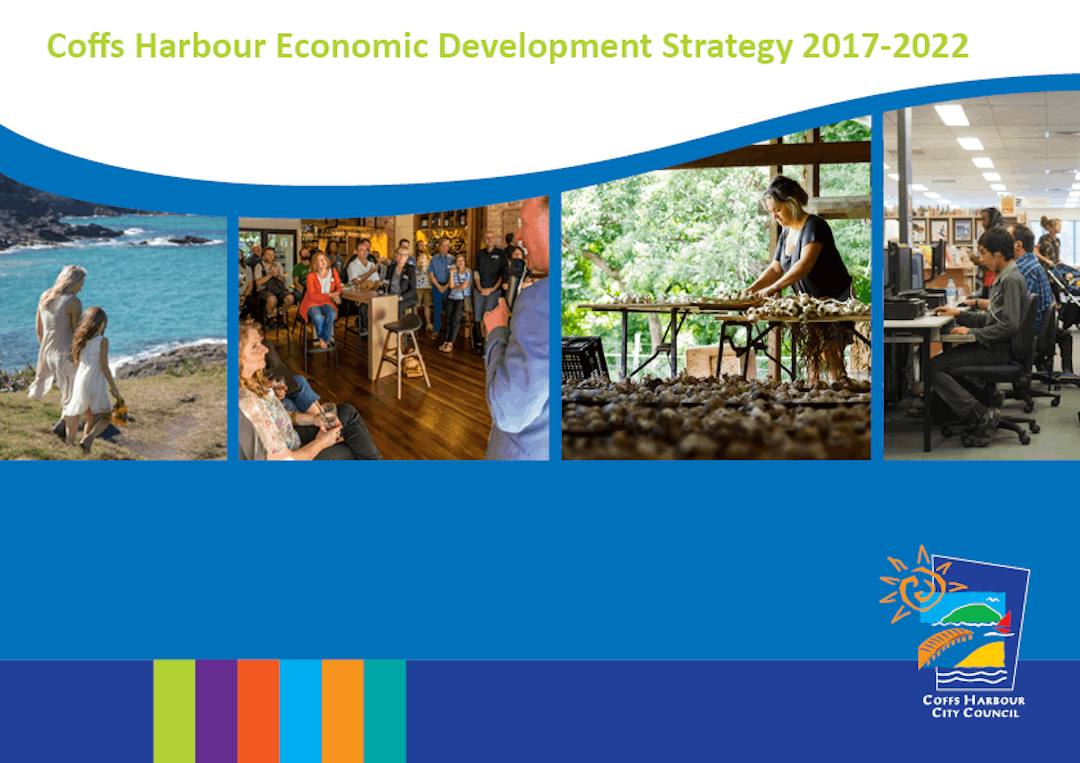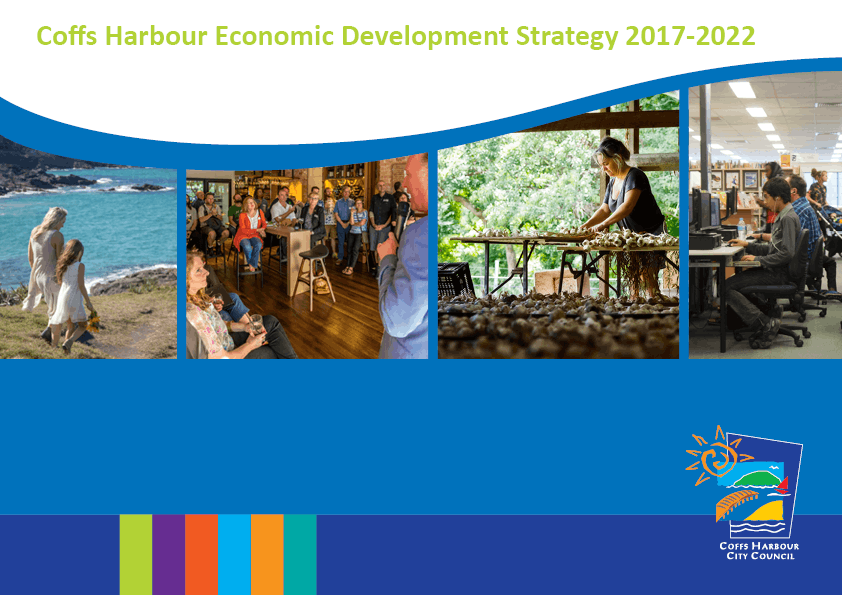Coffs Harbour Economic Development Strategy 2017-2022
Consultation has concluded

The exhibition of the Draft Coffs Harbour Economic Development Strategy 2017 - 2022 is now closed and the Strategy has been adopted by Council. The adopted Strategy can be found at http://www.coffsharbour.nsw.gov.au/Business/Coffs-Harbour-Economy
Five broad economic goals frame the Draft Coffs Harbour Economic Development Strategy 2017-2022 which is available for community comment for 28 days from August 16 until September 15. Anyone wishing to comment and/or view the documents can do by registering through this site or online at www.coffsharbour.nsw.gov.au/publicnotices. Printed copies will also be available at Council’s Customer Service Centre, corner of Coff and Castle Streets, or at anyContinue reading
The exhibition of the Draft Coffs Harbour Economic Development Strategy 2017 - 2022 is now closed and the Strategy has been adopted by Council. The adopted Strategy can be found at http://www.coffsharbour.nsw.gov.au/Business/Coffs-Harbour-Economy
Five broad economic goals frame the Draft Coffs Harbour Economic Development Strategy 2017-2022 which is available for community comment for 28 days from August 16 until September 15. Anyone wishing to comment and/or view the documents can do by registering through this site or online at www.coffsharbour.nsw.gov.au/publicnotices. Printed copies will also be available at Council’s Customer Service Centre, corner of Coff and Castle Streets, or at any of Council’s libraries.
The refresh of the Coffs Harbour Economic Strategy 2014-2017 has dovetailed with the extensive community consultation and development of the My Coffs - Community Strategic Plan (adopted by Council 22 June 2017).
Championing business, innovation and technology is one of the key directions of My Coffs, and this refresh has identified three areas of strategic importance. These have been selected where the economy has traditional strength (agriculture, tourism), but which still have growth potential, and those growth industries which drive economic growth and create jobs in shaping a regional city (digital and innovation). In all cases, these sectors are ones in which Council can play a positive role in providing civic leadership to stimulate development, investment and sustainable employment while working collaboratively with the business community.
The three areas of focus are:
- The digital economy – which is at the forefront of innovation and technology, and central to a strong services sector. Digital has now become mainstream and “business as usual” rather than merely an appendage to economic development and the creation of jobs.
- The food manufacturing and agribusiness (agri-food) economy – the latter a traditional strength of the Coffs Harbour Local Government Area (LGA), but heavily reliant on blueberries, which needs diversification, especially into value-add products, services and processing.
- The visitor economy – a mainstay of the local economy, but which operates in a highly competitive market, and has a history of under-investment within the region.
Whilst three sectors have been identified, Council will remain ready to respond to significant economic development opportunities that may arise outside of these areas, and which have the potential to create jobs. Numerous economic growth opportunities have been recognised for the Coffs Harbour LGA.
Central to the execution of this strategy is the LGA’s ability to attract people – whether to live, work, visit or invest (new businesses, investment or skilled workers). This specifically includes a younger profile of resident, skilled worker, visitor, or student and investors vital to the long-term economic prosperity of the LGA. The retention and attraction of younger people to remain or relocate to the Coffs Harbour LGA is an essential ingredient in diversifying the economic base. Their involvement in the economy will mitigate the economic downsides of an ageing population, and will open new opportunities to drive economic growth and create jobs.
The strategy to attract and retain youth will need to be part of a multi-faceted approach, including place and precinct activation.
Council will work in a collaborative manner with the community (especially the business community), investors, strategic partners and federal, state and local government agencies to establish partnerships and develop crucial enabling regional public infrastructure which will have a lasting positive impact on the region.
Council has a key partnership role to play with the LGA’s education sector and other federal, state and local government agencies in the preparation of the LGA’s future workforce.
Properly applied, these plans will guide resource allocation and investment decisions, in both Council activities and its partners in the Coffs Harbour LGA community. The successful implementation of this strategy will rest on the support of Coffs Harbour LGA businesses and the wider community.
-
Draft Economic Strategy out for consultation
Share Draft Economic Strategy out for consultation on Facebook Share Draft Economic Strategy out for consultation on Twitter Share Draft Economic Strategy out for consultation on Linkedin Email Draft Economic Strategy out for consultation link
Five broad economic goals frame the Draft Coffs Harbour Economic Development Strategy 2017-2022 which is going out for community comment for 28 days from August 16 until September 15.
Based on the foundations of both the MyCoffs Community Strategic Plan, and the previous Coffs Harbour Economic Strategy 2014-2017, this new draft strategy identifies and prioritises strategic actions and measurements.
It contains five key aims:
- Champion business, innovation and technology to stimulate economic growth and local jobs;
- Attract people to work, live and visit;
- Prepare to exploit opportunities now and in the future;
- Create and manage vibrant public places; and
- Effectively manage the planning and provision of regional public services and infrastructure.
The draft strategy has also reaffirmed the three sectors championed by the previous strategy – digital and innovation, food manufacturing and agri-business and tourism.
“As Coffs Harbour continues its development into a major regional city, the challenge we face is to help develop a workforce with the skills to support that growth,” said Nikki Greenwood, Council’s Group Leader City Prosperity.
“We also recognise the need to foster a more diverse economy. We’re currently overly reliant on a relatively narrow base of agri-food, tourism and construction and we need to broaden that base.
“Plus we need younger people to provide vitality, fill jobs, provide services and increase economies of scale. As the population ages, workforce participation declines and the rate of economic growth naturally slows. But, more positively, the ageing population also creates demand for additional services and infrastructure.
“In addition, Council and the community need to work together to identify and make the most of any currently untapped opportunities.”
Consultation for the new draft strategy began during the My Coffs Community Strategic Plan engagement. Since then, there has been further consultation with the business and broader community via workshops, one-on-one meetings with local businesses, committee workshops, briefings with local Chambers of Commerce, public consultation sessions, an online survey and a peer review.
Anyone wishing to comment and/or view the documents from August 16 will be able to do so online at www.coffsharbour.nsw.gov.au/publicnotices or there will be printed copies available at Council’s Customer Service Centre, corner of Coff and Castle Streets, or at any of Council’s libraries
Key Dates
-
26 October 2017
-
15 September 2017
-
16 August 2017
Who's listening
-

Phone 02 6648 4835 Email stephen.saunders@chcc.nsw.gov.au
Life Cycle
-
Council resolves to place Draft Economic Strategy on public display
Coffs Harbour Economic Development Strategy 2017-2022 has finished this stage -
Submissions invited for the Draft Economic Development Strategy
Coffs Harbour Economic Development Strategy 2017-2022 has finished this stageSubmissions to the Draft Coffs Harbour Economic Strategy 2017 - 2022 invited
-
Submissions close
Coffs Harbour Economic Development Strategy 2017-2022 has finished this stage -
Coffs Harbour Economic Development Strategy adopted by Council.
Coffs Harbour Economic Development Strategy 2017-2022 is currently at this stageAdopted strategy can be found on Councils website in the Business section www.coffsharbour.nsw.gov.au/Business


